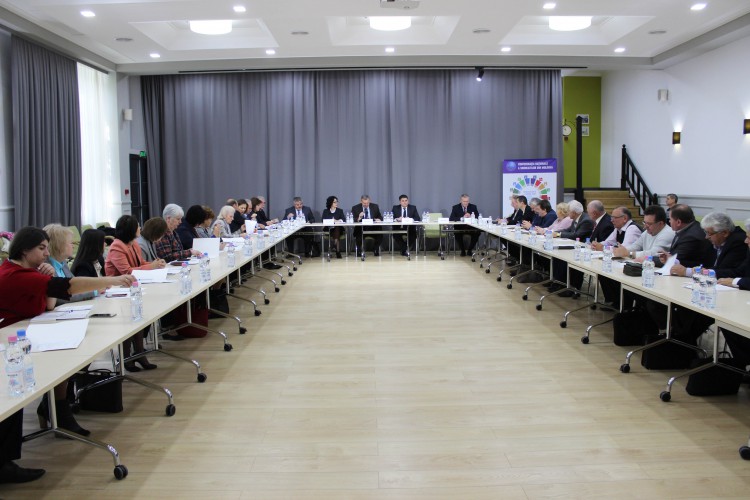Fair income, safety at work, social protection
Today, on 4 October, was held a round table entitled “For decent work: fair income, safety at work, social protection”, organized by the National Confederation of Trade Unions of Moldova, within the CNSM Labour Institute. The event was attended by Oleg Budza, CNSM President, Leonid Cerescu, President of the National Confederation of Employers of the Republic of Moldova, Ala Lipciu, National Coordinator of the International Labor Organization, Mihail Cotorobai, People’s Advocate, Octavian Calmîc, Minister of Economy and Infrastructure.
In his speech, CNSM President, Oleg Budza remarked that decent work should become the main benchmark for the Government’s actions to ensure economic growth, including the development of a new economy in which the working people benefit. From this perspective, he mentioned, the problem of labour remuneration for workers is becoming more and more acute. The minimum wage barely covers 50 percent of the subsistence minimum, which is not the real value of the needs of a worker and his family.
The president of the CNSM recalled that the CNSM III Congress set the main objective that decent work should be accessible to employees, trade union members. Moreover, he stressed, the Confederation will further promote social justice and work dignity, contribute to improving the living and working conditions of employees, insist that decent work to be included in the Government’s agenda. He stressed that if the principles of decent work were to be applied on a daily basis, then we would build a democratic society, root out corruption and have a prosperous country.
In the view of Leonid Cerescu, President of the National Employers’ Confederation of Moldova (CNPM), ensuring the conditions for the creation and activity of sustainable enterprises is a perfect goal for a deeper implementation of the concept of decent work. He assured that the CNPM will unconditionally support the country’s decent work program, as this document first tackled the situation of business organizations based on evidence. Leonid Cerescu reminded that the employers’ organizations submitted a whole series of proposals aimed at amending the labour legislation, which were coordinated with the social partners, including the trade unions.
Ala Lipciu said that for almost a decade the Globally Recognized Decent Work Agenda urges for actions for quality employment, decent income, and social protection for the worker and his family, safe working conditions, non-discrimination and career promotion.
Today, the ILO National Coordinator said that, unfortunately, economic growth is unevenly distributed, it does not necessarily ensure the creation of quality jobs. She advocated a more equitable pay in the context of an economic diversification in competitive sectors and qualifications required by the business community. The ILO advocates better social dialogue, adequate skills and qualifications, and an approximation of the education system to the labour market.
Mihail Cotorobai informed that a study conducted at the People’s Advocate demand has demonstrated that the country’s citizens appreciate the right to decent work as one of the most important goals of our society. According to him, workers claim better wages, adequate working conditions, and clear life perspectives. In his view, it is necessary to make an equal pay for work of equal value, which would guarantee a fair salary. He declared himself for the social protection, the decent living of people, for the observance of the international provisions in this respect, as well as of the constitutional ones regarding the right of people to work and a decent life.
Octavian Calmîc claimed at the round table that decent work is a very interesting, complex topic. He was pleased with the level of collaboration in this respect both with the employers’ organizations and with the trade unions. The Minister of Economy and Infrastructure has argued for the fact that, when setting some benchmarks for the remuneration of workers, the improvement of their working conditions must start from the current realities that dominate the country. He said that this year there is some economic growth, but the government would want an even more substantial increase in wages. Even so, Octavian Calmîc said, wages are rising faster than labour productivity.
The Minister of Economy and Infrastructure has assured the social partners – employers and trade unions – that all their wishes are taken into account by the Government. As a result, balanced solutions are identified as to guarantee the minimum subsistence for both employees and those who are not employed, such as retirees. For now, he said, this process is difficult, because the costs are enormous, as the national economy cannot provide the necessary revenue for this purpose.
Department of Mass Media and International Relations of CNSM



